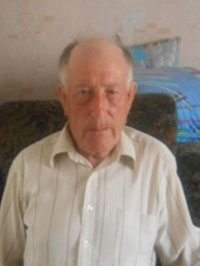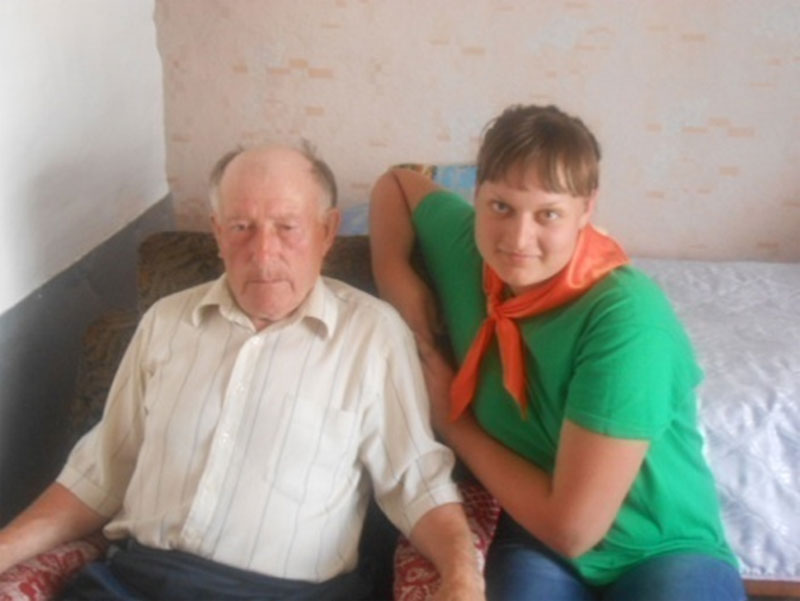









 Alexander Yakovlevich Spomer was born in Novoebasik, Ekensk District, Saratov
Region on the 14th October 1929. Mother: Yekaterina (Katharina) Filippovna
Spomer (born on 19th September 1889.). Father: Jakob Fyodorovich (born on 1st
May 1879.). Both worked on a vegetable plantation for the kolkhoz farm. Apart
from Alexander Yakovlevich there were nine more children in the family: Fyodor
(1911), Emilia (1915), Maria (1915), Albina (1919), Klara (1921), Elsa (1923),
Jakob (1925), Mila (1927), Lida (1932).
Alexander Yakovlevich Spomer was born in Novoebasik, Ekensk District, Saratov
Region on the 14th October 1929. Mother: Yekaterina (Katharina) Filippovna
Spomer (born on 19th September 1889.). Father: Jakob Fyodorovich (born on 1st
May 1879.). Both worked on a vegetable plantation for the kolkhoz farm. Apart
from Alexander Yakovlevich there were nine more children in the family: Fyodor
(1911), Emilia (1915), Maria (1915), Albina (1919), Klara (1921), Elsa (1923),
Jakob (1925), Mila (1927), Lida (1932).
Before the deportation they lived by no means in miserable conditions. They owned a big house made of bricks - 10 x 8 m in size. They had a big farmstead (with cows, pigs, turkeys, geese). Moreover, they cultivated 20 hundredth of arable farm land. During the last years they did not plant anything for themselves anymore, for both parents worked for the kolkhoz.
There are very few things A.J. is able to recall from his childhood on the river Volga. He can recollect that he used to go fishing and that he helped his mother in the autumn. During the summer he practically did not see his parents at all. They just left a number of notepads at home, on which they had written, where the children could find the necessary clothes to wear and which tasks had to be done. «A wonderful moment, - he recalls,- was, when we set about eating the watermelons, which were kept in a big storage-jar. In order to find out whether they were already ripe, we cut a little hole into them, and in case they were not yet suitable to eat, we tamped them. This procedure continued, until father gave us a tongue-lashing. It was very tedious for them to beat off the oil from sunflowers, for the mill was situated more than 5 km away from home.
About the facto f their deportation they only learned on the 1st September, when they arrived at school and the director told them: «There won’t be any lessons today, you may go home, for you have to get prepared for a long trip». The news was received calm and serene: «Needs must». From the 1st September until the 5th they gathered there belongings and packed everything up. They were allowed to carry along 3 tons in each case. The mostly needed things were: a shoemaker’s tools, clothing, tableware and food (they slaughtered a pig and baked bread rolls). On the 5th September 1941 the whole family was exiled to the hamlet of Galanino in Kazachinsk District. When they departed, they left behind a wealthy farmstead, which they had built up over many years.
Finally, they were taken to Krasnoyarsk by train. During longer train stops they were supplied by warm meals; everybody had enough to eat. Inside the wagons were travelling men as well as women. Since train stops would often drag on for 2-3 days, the people had enough time to unhurriedly get washed. In Krasnojarsk they were to board a barge, which took them to their final destination – to Galanino.
Upon their arrival they were immediately assigned a house, and after presentation of the expropriation certificate they retrieved parts of their household articles and cereals. At that time the hamlet of Galanino disposed of 60 farmsteads. The locals were very friendly – such friendly that the neighbor even permitted them to plant some vegetables on her piece of land. Everybody went to work for the kolkhoz farm in accordance with his professional education. They liked the place, all-around it was covered over by woods. With all those who had been deported, there was only one case, when two families were placed in one and the same apartment. There were no problems with regard to school attendance. Although he had already finished the 4th term in town, he went to school again in 1944 to complete the 4th and 5th terms. In 1951 A.J. took up a job as a coppersmith. In1960 he left the hamlet, in order to train as a driver. There were no difficulties in communication, for some Germans spoke Russian, several Russians were able to speak German – generally speaking the people understood each other.
Unfortunately, A.J. has a sparse knowledge about the labor army; just from what his brother, who was sent to the Kemerovo Region, told him, he heard some information. In his letters he wrote about having been assigned to raft wood. When they fulfilled the daily norm, they received a bread ration amounting to 800 gr. In case they did not make the norm, they were distributed respectively less. Men and women lived in separate barracks. They were wearing common work clothing which everybody received there. He did not always write his letters on clean white paper: due to a serious deficit of paper they sometimes were forced to write on newspaper sheets. Before sending a letter from the trudarmy it had to pass censorship in any case. The sending of parcels – either to the trudarmy or from there – was not allowed at all. But even if there had been any permission – there was nothing to be sent.
During the first time, Menyaev, who did not pay any attention to them, held the post of the commandant. Sometime later a certain Glushkov arrived to displace him – he was a very good soul. Whenever someone had to leave for some other place, he would let him go without objection. They almost did not differ from the locals; they were all wearing the same clothes, which they sewed themselves from burlap bags. They were all on friendly terms with each other,, conjointly went to the club and enjoyed folk dance (polka and waltz). They had no cinema shows in the beginning. Only in 1946 someone brought along the very first silent movie, and the admission ticket cost 5 kopeks.
In 1956 the commandant’s office, where they had to go regularly to get registered, was abolished. Afterwards, life did not change for the people, although they were now allowed to choose their place of residence freely. As regards him, he decided not to return to his home village; he is not even aware about which changes have meanwhile taken place there and what has remained the same.
At present, A.J. has not changed his opinion; he continues to believe: „Needs must“. And A.J. says about himself: „Inside myself I have nothing of a German, I am a - Siberian“…

Interview: Anastasia Davidova and Tatyana Milevskaya.
(AB – remarks by Aleksei Babiy, Krasnoyarsk „Memorial“Organization ) Ninth expedition of the Krasnoyarsk "Memorial“ Organization and the Pedagogic College in Yeniseysk, Vorokovka-Kasachinskoe-Rozhdestvenskoe 2014 .